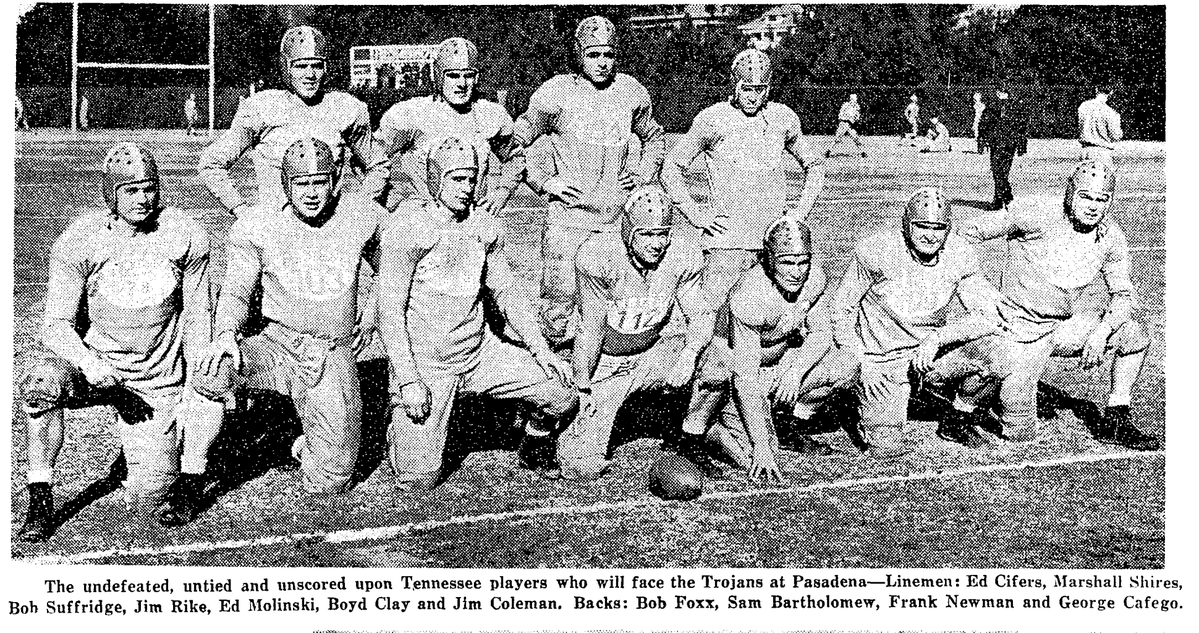
College football has many remarkable stories, but few match the 1939 Tennessee Volunteers. They accomplished something that seems impossible today: a regular season without allowing a single point. Ten games, zero points against. This record stands alone in football history as a testament to one of the greatest defenses ever assembled. But there’s more to this story than just success – it’s also about resilience, heartbreak, and controversy.
The General and His Army
General Robert Neyland led this extraordinary team. A West Point graduate, he brought military precision to Tennessee football. By 1939, Neyland was in his 13th year as coach and had already established himself as a defensive genius.
“The secret is to have eleven men on the field who won’t give up,” he often said.
His innovations included sideline telephones and game film analysis – revolutionary for that era. After leading Tennessee to a national championship in 1938, Neyland was determined to cement his legacy the following year. His philosophy was simple yet effective, captured in maxims like “Hold them without a score,” which became the team’s rallying cry.
The Stars of the Show
Two All-Americans powered the Volunteers: George “Bad News” Cafego and Ed Molinski.
Cafego, a halfback from West Virginia, had an inspiring story. Orphaned young and raised by his sister, he arrived at Tennessee with just six dollars and a borrowed suitcase. Neyland discovered him playing baseball, but football became his true calling.
“He’s a practice bum,” Neyland once remarked about Cafego. “On the practice field, he couldn’t do anything right, but for two hours on a Saturday afternoon, he did everything an All-American is supposed to do.”
Cafego excelled at running, passing, punting, and returning kicks. Throughout his career, he accumulated an impressive 2,139 total yards.
Meanwhile, Molinski, a powerful guard, anchored both offensive and defensive lines with his strength and tenacity. Together, these two stars formed the core of an almost invincible unit.

A Season of Shutouts
The Volunteers began their historic run on September 29, 1939, with a 13-0 victory over North Carolina State. From there, their defense became impenetrable.
They dominated Sewanee (40-0), crushed Chattanooga (28-0), and defeated Alabama (21-0) before a record crowd of over 40,000 fans. By late October, after a convincing 17-0 win over Mercer, Tennessee climbed to No. 1 in the AP Poll.
The shutouts continued throughout the season:
- LSU (20-0)
- The Citadel (34-0)
- Vanderbilt (13-0)
- Kentucky (19-0)
- Auburn (7-0)
Their regular season ended with a perfect 10-0 record and an astonishing 212-0 scoring margin. As Neyland taught his players, “It’s not the will to win that matters—everyone has that. It’s the will to prepare to win that matters.” Clearly, Tennessee’s preparation was flawless.

The Road to Pasadena
As SEC co-champions, Tennessee earned a spot in the 1940 Rose Bowl against USC, another undefeated team ranked No. 3. The game was scheduled for January 1, 1940, in Pasadena, offering a chance to cap their historic season with a national title.
However, getting to California proved challenging. The team endured a grueling five-day train ride with only brief stops for practice. Even worse, Cafego, their offensive star, couldn’t play due to a knee injury from their November game against The Citadel. Without their key player, Tennessee faced a serious disadvantage.
The Rose Bowl Heartbreak
The Rose Bowl stadium filled with 92,200 eager fans. The first quarter was a defensive battle with neither team scoring. However, USC broke through in the second quarter to take a 7-0 lead.
Tennessee’s offense struggled without Cafego’s dynamic playmaking. Although their defense fought hard to keep the game close, USC quarterback Ambrose Schindler proved too skilled. He rushed for 81 yards and threw a touchdown pass in the fourth quarter, sealing a 14-0 USC victory.
For Tennessee, this was a devastating end to their otherwise perfect season. As one observer noted, “The Vols were like a finely tuned machine all year, but in Pasadena, the gears just wouldn’t mesh.”
A Controversial Crown
Despite their perfect regular season, Tennessee didn’t win the national championship. Instead, the AP Poll awarded the title to Texas A&M, who had a less impressive record. This decision outraged Tennessee fans, who felt their team deserved the crown.
Many viewed this as political bias, with SEC teams often overlooked in that era. Tennessee finished No. 2 in the final AP Poll – a bittersweet recognition of their remarkable season. The controversy continues to spark debate among football historians today.
A Lasting Legacy
The 1939 Tennessee Volunteers remain legendary in college football history. Their scoreless regular season stands unmatched in the modern era. No other NCAA team has matched this achievement, and it’s unlikely any ever will.
Cafego, despite missing the Rose Bowl, became the No. 1 pick in the 1940 NFL Draft. He later returned to Tennessee as a coach for 30 years. Molinski also left an enduring impact, with his name forever etched in Tennessee football lore.
Neyland’s influence continues through the stadium that bears his name and his maxims still recited by Volunteers today. As he once said, “The most important person on the team is the one who does the job when it has to be done.”
In 1939, every Tennessee player did exactly that. They created a season that transcends mere statistics. Their story reminds us that greatness isn’t measured just by trophies but by the lasting impression left on those who witnessed it.






